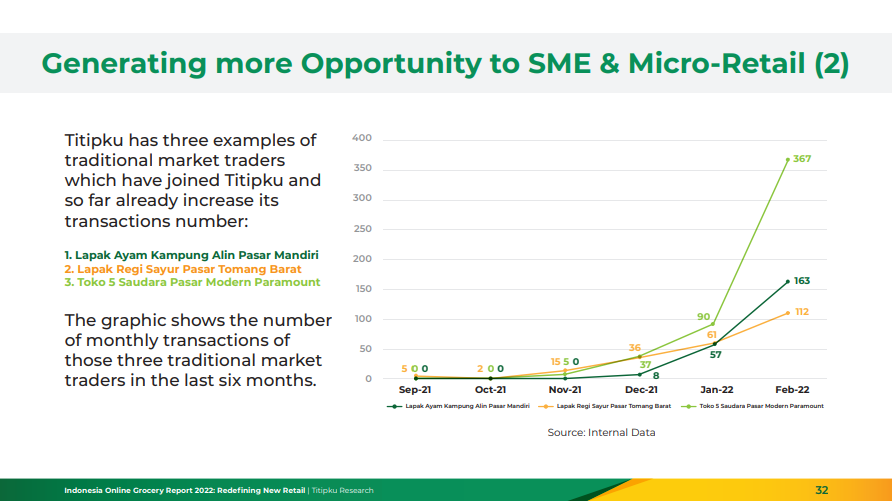Increasing Number of Markets and Pandemic Trends Drive Business Growth
Titipku currently serves around 150 traditional markets in Jabodetabek and there are around 8 thousand market traders who have joined
As a platform marketplace which focuses on connecting traders in the market with their consumers directly online, leave me claims that over the last two years it has continued to experience a positive enough increase in business up to 10 times. In addition to increasing the number of markets in the Greater Jakarta area, they also have plans to expand in Java and Bali. The hope is to add about 250 traditional markets within the next year.
In a report released by Titipku titled "Indonesia Online Groceries Report 2022", it was revealed that MSME players in traditional markets who have joined have increased their visibility to promote on social media. In addition to reaching market traders who are already quite familiar with the use of technology, Titipku also targets traders who are still using conventional methods to then adopt technology to help their business better.
Titipku also shared an example of a traditional market experiencing an increase in the number of transactions after joining the platform ecosystem. Among them are Kampung Alin's Chicken at the Independent Market, Regi Vegetable at the West Tomang Market, and the 5 Brothers Store at Paramount Modern Market.
"The pandemic then became a momentum for us to experience positive business growth. However, this went hand in hand with our activities to open new markets," said Titipku Co-Founder & CEO Henri Suhardja.
Enter the modern market
In addition to traditional markets, Titipku also provides services in modern markets and supermarkets.
Related to products that are purchased by customers, among them are protein variants such as fish, fresh meat, to vegetables, in accordance with the advantages of the market which always presents fresh products. This is what distinguishes Titipku from the platform online groceries others who mostly focus on providing frozen food only to their customers.
Titipku currently serves around 150 traditional markets in the Greater Jakarta area and there are around 8 thousand market traders who join them. Starting from Yogyakarta with a limited number of markets and traders, now Titipku wants to continue to increase the number of traders and the number of markets to strengthen their ecosystem as a marketplace.
My tip also continues to increase the number of Jatiper or personal shopper most of whom they recruit directly in their respective markets. By providing training and evaluation to them on a regular basis, it is hoped that it will change mindset them in terms of customer service.
"We want to provide an experience like a customer makes a purchase in a traditional market but is done independently online. So that it can make it easier for them to manage their time and use Titipku's services efficiently," said Henri.
Potential online groceries
In the report It was also revealed that the market groceries in Indonesia could be worth around $169,4 billion in 2022. Up from around $140,2 billion in 2019. However, traditional retailers are expected to lose out to convenience store, which will increase their market share from 8,6% in 2020 to 9,3% in 2022. Wholesale retail online will also expand from 0,3% in 2020 to 0,5% in 2021.
In Indonesia, the market e-grocery growing faster during the COVID-19 pandemic. According to a survey conducted by consulting firm Redseer in August 2020, more than half of Indonesians shopped online, and more than 60% will continue to do so.
However, in Indonesia, online shopping activities are still mostly implemented in Jabodetabek. However, the potential is still great in other areas. The Institute of Grocery Distribution (IGD) Asia said the value of online shopping will increase by 198% from $99 billion in 2019 to $295 billion in 2023, and Southeast Asia is projected to be the fastest growing country.
More Coverage:
Apart from Titipku, currently in Indonesia, there are several platforms that provide online groceries services. Among them are HappyFresh, Kedai Sayur, PasarNow, SayurBox, Segari, SeroyaMart, and Tumbasin. With the increasing number of existing competitors, it did not affect Titipku to launch its business.
According to Titipku Co-Founder & President Ong Tek Tjan, several years before the pandemic, the number of consumers who made purchases groceries in a manner online There has been a positive increase, but the pandemic has certainly accelerated everything. Now when the condition has started to recover and many people are returning to do their shopping activities at traditional markets on a regular basis offline, does not reduce consumer interest in doing online groceries.
"For Titipku in the future, it will not only improve the quality of service to buyers but also the competitiveness of traders. One of them is by providing capital assistance to them."
Sign up for our
newsletter

